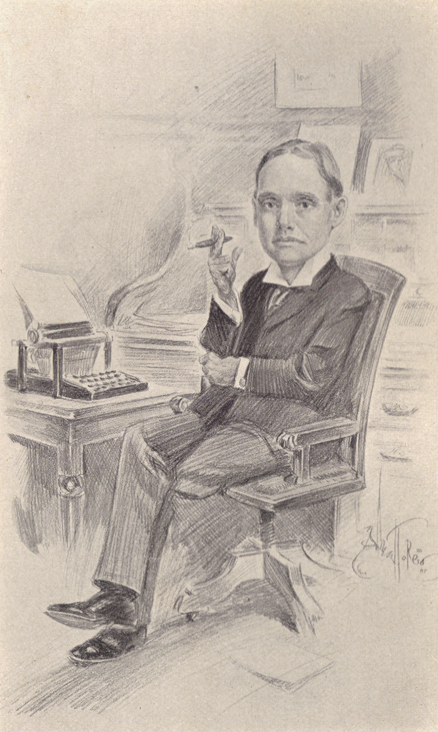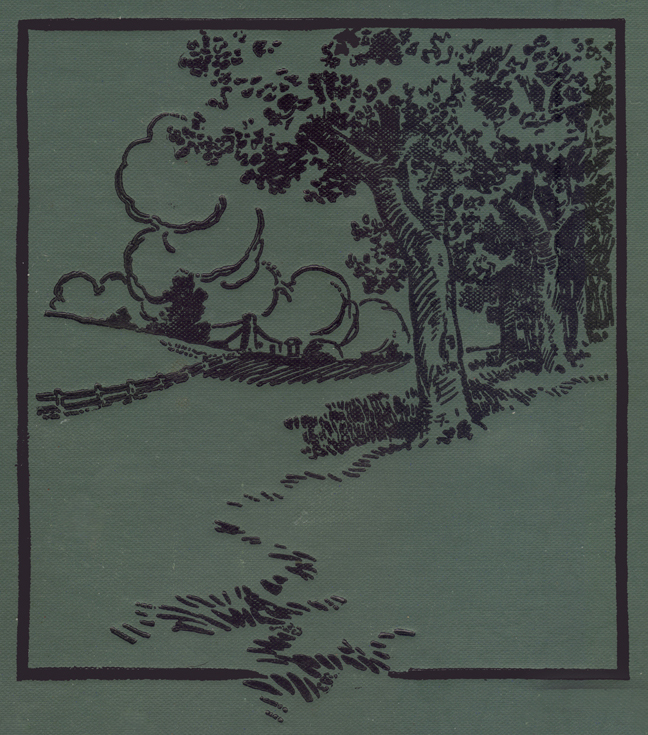
From At the Grass Roots, Comprising “The Christmas of 1883,” and Other Vagrant Sketches, by Elmer House (Dodd Gaston), with Cover Design and Frontispiece by Albert T. Reid, Topeka: Monotyped by Crane & Company, 1905; pp. 101-112.

Somebody once asked me to tell the most interesting episode in my experience. I think now that it was my attempt to give the town of Opolis a metropolitan daily newspaper. Opolis was a little shack town on the edge of a prairie. They claimed a population of 10,000 people and had the figures to prove the claim, but I have always thought they counted the tombstones in the burying-ground and the names on the old hotel registers in making the compilation.
I lit in the town one day along toward the crimpy end of an unpleasant autumn, without money and without a job. Although the town had already three daily and two weekly newspapers, I found that another daily was badly needed. There was much dissatisfaction with the press of the community. The fellows who were running newspapers in Opolis were, it 102 seemed, slow and non-progressive. I gleaned from sundry conversations with real-estate agents, lawyers and probable candidates for office at the next election, that what the town really needed was a bright, clever young fellow who could throw vim and snap into his work.
As my entire capital at that time consisted of vim and snap, I concluded I had found a lucrative field for its investment, and having neither money nor job I concluded to start the fourth daily newspaper in the town. Before I took the final step I went around to see the slow, non-progressive fellows who were running the sheets already established. I intimated to each of them in turn that if he would give me a job at $10 a week I would drop my hastily formed plan to drive him out of business, but the “stall” wouldn’t fight, an I went ahead with my plans for a bright, snappy, metropolitan newspaper.
I knew a man in a near-by city who 103 had a printing plant lying idle, so I borrowed the necessary railroad fare and went down and leased it. On the same trip I touched a friend for $25 to pay freight on the plant and for incidental expenses. When I finally got my material set up in a room for the rent of which I had stood the landlord off, I had $4 left. A dollar of this I used as advance payment on a stove for which I had gigged a second-hand dealer, another dollar was expended on coal, and a third went into the cash drawer of a retail dealer in lamps, kerosene and sponges. The remainder of the nest-egg was deposited with the barber and haberdasher in an effort to bring my personal appearance up to the standard required of newspaper proprietors.
On the morning of the day of the first issue of the Opolis Daily Sun I had hope in my heart and ten cents in my pocket. The white paper for the first two or three issues of the Sun was borrowed from one 104 of the competing sheets upon the representation that the carload I had ordered had not yet arrived. I may as well say here that the particular carload of paper in question hasn’t reached me yet.
I had gathered together a rattling good staff. One indication of the weakness of humanity is that every man who gets to know me well wants to work for me. It was an all-’round staff, too. Every man on the paper could write editorial or news, set type, run a press, or solicit advertising. There were seven of us all told, and I shall always believe it the best aggregation of newspaper talent ever gathered under one canvas in a town the size of Opolis.
In order to avoid embarrassment on Saturday nights, I made the Sun a coöperative concern. I was to have the last word in matters of policy, but the profits of the enterprise were to be shared equally. Whenever I get to thinking I 105 know nothing about business I recall the masterly manner in which I evaded payday on the Opolis Daily Sun and am reassured.
We started out with a shriek and a hurrah. The first issue of the paper was made on a Monday, and the city editor was thrashed by an indignant citizen within thirty minutes after the Tuesday issue was on the street. I had trouble with the owner of the theater on Thursday, and only escaped a fight by putting up a strong bluff. The advertising manager was ordered out of the biggest store in town Saturday because of a “hot” story, incriminating the proprietor, unloosed by the police reporter in an effort to be funny.
The Sun sold like twenty-dollar bills at reduced prices on the streets. Sometimes we disposed of as many as 100 copies a day, but somehow not a great deal of money came in at the gate. On the first Saturday night there was $1.30 106 in the cash drawer after the incidental expenses had been paid, and after I had divided it pro rata, we all went out an took a shave and a sack of smoking-tobacco.
The Sun Publishing Company ran along for a month with little annoyance from creditors. Occasionally, on Saturday nights, the dividend was forty or fifty cents apiece and the company enjoyed the luxury of a cigar. One week the business manager insisted on getting a shave, a haircut and a shampoo, and it cut the profits down to ten cents apiece. On another occasion the foreman, who had, as was his wont, fallen in love, insisted on spending the entire week’s earnings for carnations, and no dividend could be declared. This caused some hard feeling on the part of his fellow-stockholders, and was really the beginning of the end.
At the end of the first month the advertising collections were insufficient to 107 pay more than a small installment on our combined hotel bills, and he landlords began to give us the stony stare. The Boniface at the Astor House had the bad taste to remonstrate with the manager of circulation. “Hell!” said the manager of circulation, who was a somewhat profane men, “you’ve got no kick coming. You’re only feeding two of us. The autocrat over at the St. James is keeping the coyotes from the door of the editor, the business manager, and the foreman. You’re really not doing your share.”
By the middle of the second month the cordiality of the people had not only congealed, but it had reached a thickness of fully sixteen inches. The ice with which the town encased itself against our approach broke all records for that latitude. Everything we ordered began to come C. O. D., and our position at the hotels became absolutely untenable. So I rented a suite of two rooms furnished 108 with a couple of beds, three chairs, a kerosene lamp and a combination stove. The foreman’s mother sent him $5 for a birthday present, and we bought a coffee-pot, a frying-pan and a miscellaneous assortment of tinware and began doing our own cooking.
I made arrangements for a week’s credit at a butcher-shop and a grocery store and we got along fairly well, the advertising man doing the cooking and the balance of us taking turns at washing the dishes, until the butcher and grocer called our bluff the following Monday. By that time everybody was “next.” Creditors began to multiply and harass us. I went to and from the office through alleys and by the way of unfrequented streets in order to avoid meeting people we owed. We lived literally from hand to mouth. Frequently we had money sufficient to buy baker’s bread, butter, and coffee. Occasionally, we had meat. Sometimes we were down to baker’s bread and mighty little of that.
109The greatest office expense was white paper, and we bought and borrowed until the limit was reached. One of our competitors had gotten out a rather elaborate Christmas edition. He ran a weekly publication and used what is known in newspaper offices as a patent inside. For his Christmas edition he had ordered larger supply of patent insides than his circulation warranted, and the superfluous Christmas stories and “Peace and Good Will” poetry was piled in the rear end of his office, one side blank. The business manager, who had a good head, deftly lifted the rear window of the competing office one night and stole the pile of patent insides. It gave us a bad name in the town when the story came out, but it deferred the obituary notice of the Daily Sun several days.
We made luncheon one day on water poured over the remains of the coffee with which we had girded up our loins at breakfast. “You’ll have to do something,” 110 I said to the business manager that afternoon when the dinner hour began to stare us in the face. “If this Dr. Tanner business keeps up another day we’ll have to suspend.” The foreman had been growling all afternoon and threatening to jump to “Chi,” and there was every indication of a general storm.
The business manager’s name was Grim. Poor fellow! He crossed the dark river by the laudanum route a year or two later because the girl he loved could not care. Grim went out dejectedly. He came back just at dusk, an hour or two later, and laid a quarter on my desk. “I had to do it! I had to do it!” he kept saying to himself as he walked away. “Had to do what?” I asked. “I robbed a little boy who was going after meat,” replied Grim with a sob in his voice.
The end came suddenly the following forenoon. Along about eleven o’clock the close-fisted miser from who we 111 rented our apartments sent word that we could neither occupy them nor remove our personal effects until we paid the rent. The bill was $6: it might just as well have been $6,000. “The jig is up,” I said to the Sun Publishing Company when I read the miser’s note. “I’ll go out and sell the Sun, or give it away.”
Around the corner I met the idle eldest offspring of the Episcopal rector. He had been pestering me for a job as a reporter, and tackled me again for the fifth time in three days. “I’ll sell you my interest in the plant, the good-will and the business for $10,” said I. “If I can borrow the money from mother, I’ll take it,” he replied after a moment of becoming hesitation. The offspring came back in a half-hour with a $10 bill and the deal was closed. The members of the Sun Publishing Company put on their coats and went out to a quick-lunch counter. The next morning the four remaining members who had been able to 112 successfully conceal themselves from the brakeman during the long night, disentangled themselves from a car attached to a fast freight in the Burlington yards, Chicago, and the company dissolved.
